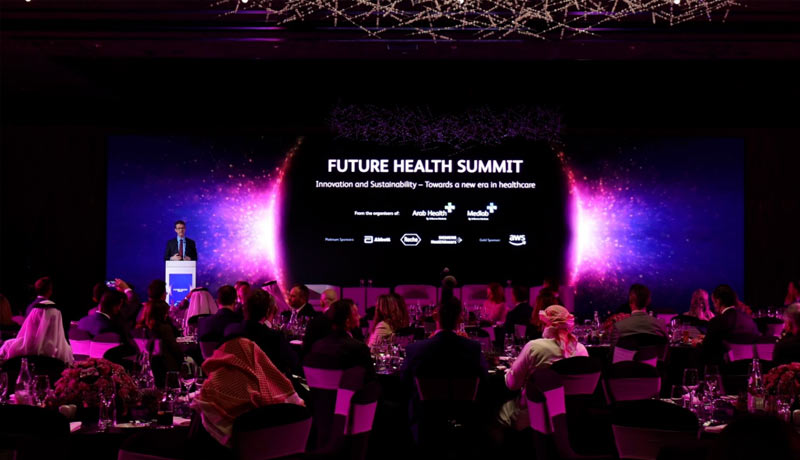
The inaugural Future Health Summit brought together senior government healthcare officials, CEOs, and visionaries from around the world to hear from a variety of specialists on the future of the healthcare and laboratory industries.
The invitation-only, in-person summit, organised by Arab Health and Medlab Middle East, two of the MENA region’s leading healthcare exhibitions, addressed some of the most pressing issues affecting the global healthcare industry, as well as the barriers and opportunities for ensuring sustainable healthcare for all.
H.E. Dr. Amin Hussain Al Ameeri, Asst. Undersecretary of the UAE Ministry of Health and Prevention’s Health Regulation Sector, made an open statement. The CEO of Informa, Lord Stephen Carter, Baron Carter of Barnes, greeted guests and emphasised the necessity of the healthcare business coming together to discuss and debate the way forward. He stated,
“We hope that as we move from pandemic to endemic, as we learn to live alongside a change in circumstance and everything that goes with it, we can share those learnings.
“If we’ve learned nothing over the last two years, we’ve learned that sustainability and innovations are now centre stage for countries, for companies and industrial sectors. And I know of no topics that are more important for the markets we serve.”
A panel discussion on sustainability, innovation, and the future of healthcare was one of the evening’s highlights.
Dr Alaa Murabit, Medical Doctor, Global Security Strategist, Women’s Rights Advocate, and United Nations High-Level Commissioner on Health, Employment, and Economic Growth; Dr Sameh El-Saharty, Program Leader for Human Development, GCC Country Department, The World Bank; and Veronica Beneitez Piero, Deputy Head of Unit, Transition and Business, European Commission were among the panellists, moderated by Marwan Abdulaziz Janahi, Managing Director, Dubai Science
The committee looked at new ideas for securing long-term healthcare, tackling healthcare reform, improving healthcare spending efficiency, and leveraging the digital era’s revolutionary impact.
Dr. Alaa, speaking about the activities needed to strengthen health financing systems, particularly in low-income countries, said:
“It has been an advocacy of the healthcare community to urge and usher in universal healthcare as a shared understanding that health care is a fundamental human right.What we have seen the most clearly in countries that are accountable for the percentage of financing that they put into health care and hold themselves accountable to that number have done best. Nigeria is a good example of this.”
The necessity of acknowledging that the health system should not be viewed in isolation is one of the important takeaways from the panel discussion. Every government department has a responsibility to play.
Only 20% of healthcare outcomes, according to Dr. Saameh, are the product of healthcare delivery systems. “Only 20% of health outcomes are contributed by clinics and hospitals,” he stated. Surprisingly, socioeconomic, behavioural, and environmental factors account for 80% of the variance.
“I think there is a role for different sectors to play in terms of improving health outcomes. Road safety, banning smoking and adding taxes to tobacco products, healthy eating in schools for children, these are the roles of many different government departments, but they need to come together for the benefit of the healthcare sector.”
Leading innovators in the healthcare and laboratory sectors demonstrated a variety of cutting-edge technologies as part of the evening. Ionut Taranu, Head of Marketing and Healthcare Consulting, Roche Middle East, shared his thoughts, emphasising the necessity of building good connections. Dr. Bernd Onesorge, President EMEA, Siemens Healthcare, joined him to discuss the latest healthcare advancements, while Damian Halloran, VP Infectious Disease, Emerging Markets, Quick Diagnostics, Abbot Laboratories, discussed the future of rapid diagnostics.